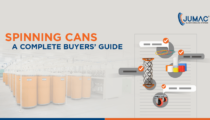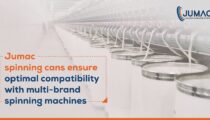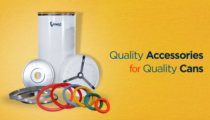The role of quality-assured spinning cans in ensuring optimal yarn…
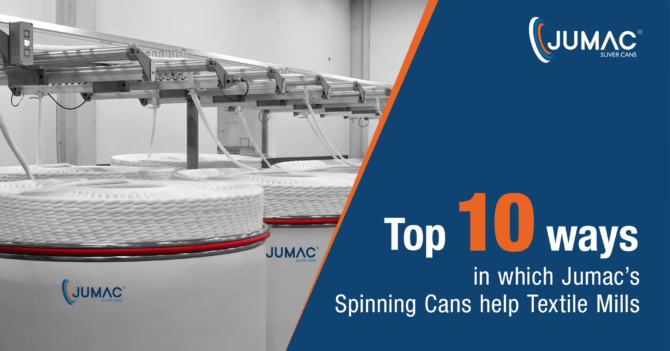
Top 10 Ways In Which Jumac’s Spinning Cans Help Textile Mills
The performance, productivity and reliability of spinning cans plays a key role in determining the quality of operations at a textile firm. A sub-standard spinning can is likely to cause multiple problems – with sliver deflections and breakage being common issues – resulting in poor yarn packages. That, in turn, highlights the importance of using spinning cans from a reliable manufacturer (and not just going for a cheaper alternative). In today’s discussion, we will highlight how Jumac Manufacturing has been helping the textile industry, by providing the best-in-class spinning cans:
Optimal Quality & Consistency
The High-Density Poly Ethylene (HDPE) spinning cans manufactured by Jumac are of uniformly consistent quality and are perfectly designed for the best possible performance. Stringent quality standards are followed during the production of each and every spinning can – so that customer satisfaction is always a given. Cans of varying diameters – right from 225 mm to 1200 mm – are available, so that buyers can pick the can(s) that would be ideal for their requirements. Jumac also manufactures standard quality cans of customised sizes, enhancing usability.
Usage Of Suitable Material In Each Spinning Can
In order to counter the considerable centrifugal force generated during spinning operations, Jumac’s cans come with strong top and bottom covers (both made of plastic). For spinning cans of more than 24 inches (and upto 48 inches), galvanised steel sheets of high durability are applied. The body sheet of the spinning cans is of HDPE, which minimises mechanical stress (i.e., wear and tear) and related damages. The seamless butt weld of the Jumac cans adds to their performance efficiency, as does the uniformly cylindrical body – with the anti-static finish. High flexibility is yet another hallmark of the spinning cans we manufacture.
Powerful ‘Smart Can’ Features
The virgin HDPE sheet spinning cans delivered by us come with an array of powerful features that boster the cans’ overall utility and advantages. The technical specifications of each can are explained in detail so that users can have full and quick access to all the information they need. This ensures that there is no guesswork involved when a textile mill starts using our spinning cans. Superior applicability is yet another advantage – with Jumac cans being usable at different phases of the spinning process, like draw frames, combers, cardings, rotors, and others. The cans have uniformly user-friendly features and controls, and in case of any queries – customers can get in touch with our round-the-clock customer support team anytime. Assistance is never more than a call away!
Compatibility With Textile Mill Machines
The machines used for spinning yarns in textile mills are constantly evolving in terms of technology and usability. The focus has to be on creating state-of-the-art spinning cans that are fully compatible with the different machines AND the different processes of spinning (e.g., carding, roving, combing, rotor spinning, etc.). The cans (HDPE sliver for general textile mills; aluminium sliver for jute textile mills) are damage-resistant – ensuring that the sliver finish is retained, and the cans actually help in spinning premium quality yarns. In general, textile mills that use our spinning cans can boost their operational efficiencies – thanks to superior sliver loading capacities, higher durability, and easy usage.
High-Quality Coated Springs
The tempered and carefully hardened springs used in Jumac cans are instrumental in maximising the quality and efficiency of the latter. The springs used by our team ensure full retention of sliver properties – and they can be used in spinning cans of different sizes/diameters. Moulded propylene is used in the spring bottoms so that they do not cause any damage to the cans (particularly during spring insertion). All spring specifications, including pretension values, are clearly mentioned. By monitoring the spring thrust, system imbalances and/or haphazard movements of the cans/spinning yarns can be avoided easily. The best spinning cans have the best springs – and at Jumac Cans, we provide just that.
Rims, Bands and Plates
The plates and rims added to the bottom of Jumac spinning cans are manufactured with strong, heavy-pressed galvanised iron. Compatibility with toothed belts are ensured by these fittings, and it adds to the overall longevity of the cans as well. The bands and rims used at the top are made of uniformly smooth galvanised or stainless steel – and they make sure that the high rotational speeds of spinning machines do not damage the cans in any way. The bands are rust-resistant and are important for preventing accidental collapses or damages.
Minimal Imperfections
Imperfections in sliver handling are one of the most common reasons behind sub-optimal performance of spinning yarns in particular, and textile mills in general. Jumac helps textile mills by supplying a fully diversified range of spinning cans, with minimal sliver handling imperfections. The accessories are made of best-grade stainless steel – which, together with the virgin HDPE cans, promise high-performance assurance. Mills typically look to achieve seamless material handling in their yarns – and that is delivered by the high-quality Jumac cans.
Caster Wheels That Add Value To Spinning Cans
The yarn production processes at textile mills generate a considerable amount of chemicals and dirt. To ensure that these do not affect the long-term performance of the spinning cans (and hence, the mills), our cans have swivel caster wheels with powerful corrosion-resistance, excellent temperature balance, and superior tensile strength. Keeping in mind the portability requirements of spinning cans at the different phases of production, 360° rotation wheels are present in the casters. The high-pressed zinc coating of the casters help in maintaining the abrasion-resistance, and ensuring that they aid the performance of the spinning cans. With Jumac cans, users at textile mills do not have to worry about the additional wear and tear.
Focus On Innovation
The export of Jumac spinning cans started way back in 1999. Since then, as our operations have expanded, we have maintained an unwavering commitment for innovation. At our company, we are always on the lookout for newer and better solutions – solutions that are more cost-effective and deliver higher ROI figures to textile firms. Not surprisingly, Jumac is currently among the biggest manufacturers of spinning cans for textile mills.
Sound in-house Infrastructure
At Jumac, the focus is squarely on delivering solutions that help all types and sizes of textile mills. We make sure that the latest technologies are being made use of, to manufacture cans of assured quality. The time-to-market is also short, and everybody has the relevant experience to help customers – both by following optimal manufacturing standards, and by resolving queries on priority. All cans are developed in-house, and nothing is delegated to other third-party firms. Transparency builds assurance.
Over the years, Jumac has always closely monitored each and every stage of the spinning can manufacturing process. Right from the welding machines, dryers and vacuum tools, to humidifiers, moulding machinery and other related equipment – every component is selected with the utmost care so that textile mills receive the best spinning cans. Delivering best-in-class cans at competitive prices has always been our mantra – and we will continue to help textile mills by staying true to this commitment.
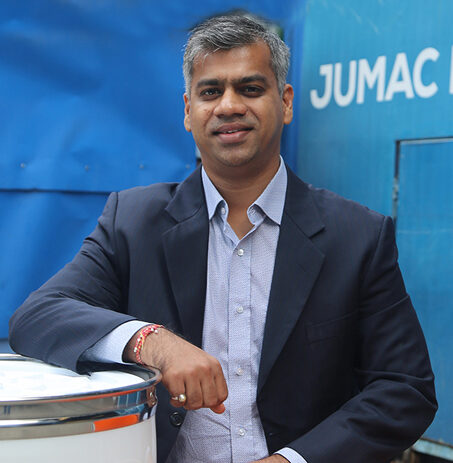
Passionate about transforming the industrial sector of textile and spinning industry with innovative solutions. Director at Jumac Manufacturing, leading spinning cans and accessories manufacturer and exporter from Kolkata, India.





